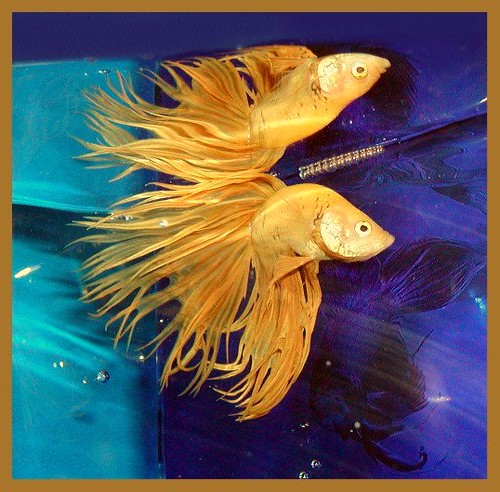I've looked around the net quite a bit and haven't found an answer to this one. As you're the enthusiast, perhaps you'll know. My betta started out life completely white with a red dot on his tail. After finding a nice home in my 20g tank with a few other social fish, he blossomed and turned gorgeous colors. And what I say turned, I mean it! He's been many different colors; the only thing that's been constant is that little red dot. At the moment, he's mostly all black including his lips. Is this normal? Please tell me my fish is just super happy and putting on a gorgeous display for my family and me. I'd love to hear what you think.
A: It is not at all unusual for bettas to change colors over the short and long term. Betta fish that have been living on a store shelf are often pale versions of themselves. This bland coloration is the result of stress caused by a small container, poor water quality and low water temperature. Once the fish is acclimated to a better living condition their true colors will come out (both literally and in terms of personality too). Within the first few days and weeks in clean warm water the fish will become bright and lively. This is a signal to you that you are doing a good job caring for your betta.
Bettas may also change color over the long term. Over the years your betta’s dominate color may begin to change. In some fish this change may be slight. A bright red betta, for example may begin to show some black coloration around his head but will often stay mainly red. Other bettas may show more extreme color changes. I had a green and blue betta that over the years transformed into a dark red. I have also seen young white bettas over time develop striking blue or pink coloration in their fins.
Often bettas will change color in certain parts of the body. Most common areas for color change are the head region. The crown of the head will often change to a dark black in darker colored bettas or a yellow or rust color in lighter betta fish. The area under the mouth often changes too. As a betta ages you may notice a graying or blander coloration. Betta fish keepers often refer to this as the “betta beard,” a sign that your fish is becoming an old man. The fins often change color too, particularly the tail fin (also called the caudal fin), the dorsal and anal fins. The pectoral and pelvic fins don’t typically have noticeable color changes.
Rapid color changes from bright vibrant color to dull or pale color may be a signal that your betta is sick. If you notice this sort of color change keep an eye out for other signs of disease and test your water.
It sounds to me that your betta has been through quite a change. I don’t think I have ever seen a betta go from white to black. If you have photos from before and after email them in and I will post them on the blog for all to see. This goes for any of our readers. Feel free to send in your color changing betta photos.
Here are mine:






















No comments:
Post a Comment